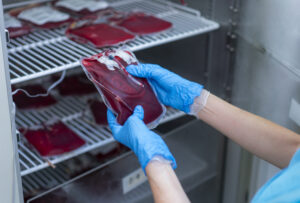In 2020, two randomized clinical trials found that liberal RBC transfusion hemoglobin (Hb) thresholds were non-superior to restrictive thresholds for preterm infants. To determine the extent to which restrictive RBC transfusion practices are used in neonatal intensive care units (NICUs), 1143 preterm infants (median gestation age at birth, 28 weeks and 2 days; 56% male) born during a six-week window in 2022 or 2023 in 64 NICUs in 22 European countries were followed until death, discharge, or the end of the study period. During the study, 35% (396/1143) of the preterm infants received at least one RBC transfusion. Indications for transfusion included hemoglobin levels (82%), active bleeding (5%), surgical procedures (3%), and other (9%). Overall, 48% and 56% of transfusions based on hemoglobin levels were given for pre-transfusion levels between restrictive and liberal thresholds as defined by the Effects of Transfusion Thresholds on Neurocognitive Outcomes of Extremely Low-Birth-Weight Infants (ETTNO) and Transfusion of Prematures (TOP) studies, respectively. Furthermore, over 7% of RBC transfusions given to the preterm infants were above liberal thresholds as defined by both trials. Adverse events were reported in only 0.2% of the transfusions. Definitions of optimal transfusion practices in neonates are needed.
Reference:

